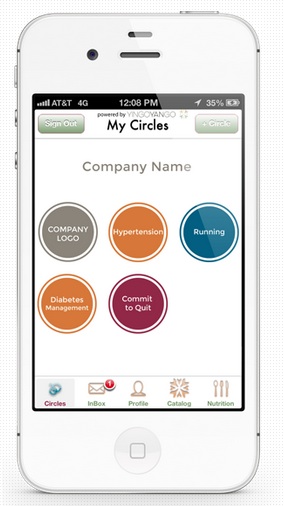 Yingo Yango's app.
Yingo Yango's app.
Digital health accelerator StartUp Health announced its latest class of 14 companies, including some familiar names. StartUp Health is a little different from other accelerators as it accepts companies at any stage and from anywhere in the country and mentors them for 3 years, rather than a few months.
StartUp Health reported, along with the announcement of the new class, that the 46 companies in the StartUp Health Academy have now raised a combined $106 million. Here are the 14 new companies:
@Point of Care 360 is a "continually updated point-of-care reference tool and platform for the clinician, which interfaces with customized real-time patient care journals." CEO Robert Stern was formerly the head of MedPage Today, which was acquired by EveryDay Health.
1EQ is working on an app that will take biometric data from self-tracking devices and turn it into mobile-based instructions for improving health and wellness. What makes 1EQ a little different from other behavior change apps is that it also incorporates genomic and clinical data, according to the company's website. Exactly what the data streams will be is not yet clear.
AdhereTech, the smart pill bottle company, has been covered by MobiHealthNews before. AdhereTech recently announced that Weill Cornell Medical College in New York City will be conducting a clinical trial of AdhereTech on 70 HIV-positive patients. Additionally, CEO Josh Stein announced at Health 2.0 that the company is planning a trial with Boehringer-Ingelheim in the near future.
CoheroHealth is also working on medication adherence, specifically asthma inhaler adherence for kids. The company's pitch is somewhat similar to Propeller Health (formerly Asthmapolis), in that the company is working on a smartphone-connected inhaler sensor. Cohero's patient app will interface with doctors' electronic health records and will use gamification to improve adherence.
DataGenno's project is to build a crowdsourced database of symptoms and gene markers of rare diseases. The company says on its website that the database is built for "health care professionals, researchers, scientists and patients."
Edamam is also building a crowd-sourced database, but on a more widely accessible topic: food. Edamam aggregates recipes from food websites around the Internet, and isolates the nutritional information to make it easy to see the healthiest options. The company uses a "proprietary semantic food and nutrition knowledge database and natural language processing algorithms," according to StartUp Health.
Gene by Gene was founded in 2000 and recently acquired Arpeggi, another StartUp Health company. The company was one of the first to tackle consumer genetic testing. It offers tests related to ancestry, health, and paternity and also for research purposes.
Medicast. A lot of people talk about digital health being the new house call. But Medicast is actually using mobile phones to bring back the house call. The service lets you call a doctor who will actually show up to your house, office, or hotel within two hours, according to the company. The service is currently available in Miami at a base price of $200 a visit.
Ondello enables doctors to communicate with patients through online video messaging. By using a protocol called WebRTC, the company can deliver communications to any browser without requiring the user to download special software.
Respondesign is a longstanding fitness game company now making a transition into Kinect-based physical therapy. MobiHealthNews spoke to the company for our report on the Microsoft Kinect in healthcare. Respondesign's game, called Fitworld, is being developed in conjunction with Genesis Rehab Services.
RxApps, a Rock Health company formerly known as PrescribableApps, tracks patients' health, experience, and behavior using text message prompts. The company presented at a Mobile Monday event co-hosted by MobiHealthNews earlier this year. Founder John Moore III explained that by making it easy for patients to check in with just a few numbers, they were able to bolster the response rate.
Sense Health provides a back end for providers to interact with patients outside the office, somewhat similar to RxApps. Providers can use Sense Health's platform to program a schedule of interactive text messages for patients. The platform provides some pre-made scripts to start and tools to program customized ones.
TedCas is developing touch free interfaces, using platforms like the Microsoft Kinect and Leap Motion, to help maintain sterility in hospitals while still allowing physicians to access data and imagery. This kind of interface can be particularly useful for certain kinds of surgeons.
Yingo Yango provides a white labeled health engagement app, both for providers to give to patients and for employers to distribute to employees. The app promotes behavior change and health engagement by connecting patients to "integrated ecosystems."


















